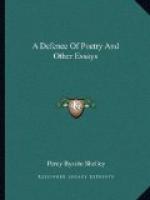In physical knowledge Aristotle and Theophrastus had already—no doubt assisted by the labours of those of their predecessor whom they criticize—made advances worthy of the maturity of science. The astonishing invention of geometry, that series of discoveries which have enabled man to command the element and foresee future events, before the subjects of his ignorant wonder, and which have opened as it were the doors of the mysteries of nature, had already been brought to great perfection. Metaphysics, the science of man’s intimate nature, and logic, or the grammar and elementary principles of that science received from the latter philosophers of the Periclean age a firm basis. All our more exact philosophy is built upon the labours of these great men, and many of the words which we employ in metaphysical distinctions were invented by them to give accuracy and system to their reasonings. The science of morals, or the voluntary conduct of men in relation to themselves or others, dates from this epoch. How inexpressibly bolder and more pure were the doctrines of those great men, in comparison with the timid maxims which prevail in the writings of the most esteemed modern moralists! They were such as Phocion, and Epaminondas, and Timoleon, who formed themselves on their influence, were to the wretched heroes of our own age.
Their political and religious institutions are more difficult to bring into comparison with those of other times. A summary idea may be formed of the worth of any political and religious system, by observing the comparative degree of happiness and of intellect produced under its influence. And whilst many institution and opinions, which in ancient Greece were obstacles to the improvement of the human race, have been abolished among modern nations, how many pernicious superstitions and new contrivances of misrule, and unheard-of complications of public mischief, have not been invented among them by the ever-watchful spirit of avarice and tyranny!
The modern nations of the civilized world owe the progress which they have made—as well in those physical sciences in which they have already excelled their masters, as in the moral and intellectual inquiries, in which, with all the advantage of the experience of the latter, it can scarcely be said that they have yet equalled them,—to what is called the revival of learning; that is, the study of the writers of the age which preceded and immediately




